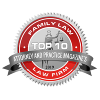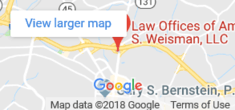Towson Divorce Lawyer | Divorce Hearings.
Court Hearings Are Central to the Maryland Divorce Process
Amar S. Weisman is recognized for representing more than 600 Family Law at divorce hearings. His ability to represent clients in Court is reflected has been recognized by clients and peers in the following ways:
- Rrated as one of the top divorce lawyers by Expertise.Com,
- Awarded Top 10 Family Law by And Practice Magazine for 2020
- Awarded Top 10 for Client Service by the American Institute of Family Law Attorneys every year since 2016. ,
- Rated "Suburb" by Avvo
- Rated 4.7/5.0 By Clients on Google
Maryland Divorce Procedure in Baltimore County – Key Hearings and What to Expect
Divorce in Maryland is a legal process that involves several court hearings before a final decree is issued. In fact, Maryland law requires at least one spouse to give live testimony in court before a judge can grant an absolute divorce. This means your divorce won’t be finalized by paperwork alone – a hearing is mandatory. The Circuit Court for Baltimore County follows a structured process (called a Differentiated Case Management plan) to move cases along efficiently based on their complexity. Below we explain the main types of divorce hearings in Baltimore County – what they are, when they happen, and what typically occurs at each stage. Throughout each step, having an experienced attorney like Amar S. Weisman is invaluable. Mr. Weisman has represented clients in over 900 divorce and family law hearings, earning recognition as one of the top divorce lawyers in Baltimore. He will ensure you are prepared and protected at every court appearance.
The Scheduling Conference
The scheduling conference is usually the first court date in a contested divorce case, held soon after the defendant (your spouse) files an answer to the divorce complaint. In Baltimore County, this conference often takes place in the courthouse (Towson County Courts Building) before a Family Law Magistrate – a judicial officer who helps manage the case. It may be set a few weeks to a month after the case is at issue.
The purpose of the scheduling conference is to plan out the rest of your case. The magistrate will identify the issues in dispute (for example, custody, child support, alimony, property division) and then calendar all future events and deadlines. This includes setting dates or timeframes for discovery (the exchange of financial information and evidence), mediation sessions, a settlement conference, and a potential trial date. Baltimore County uses a track system based on case complexity – simple cases are put on an expedited track and complex cases on a longer track – which determines how much time the parties have to prepare.
Scheduling conferences in Baltimore County are relatively informal. You and your attorney meet with the magistrate in a conference room rather than a formal courtroom. The magistrate may ask each side basic questions about the marriage, the children, and the contested issues. Key topics include whether either party will seek temporary relief (for example, a Pendente Lite hearing for interim support), the time needed for discovery, and whether expert evaluations might be required. In many cases, the court will order parties to attend certain programs at this stage – for instance, a parenting class if you have minor children, and often mandatory mediation for custody disputes. The court may also require both spouses to exchange preliminary financial information to facilitate early settlement discussions.
At the end of the scheduling conference, the court issues a written Scheduling Order. This document governs all the key deadlines in your case. The Scheduling Order will set the deadline by which all discovery must be completed, deadlines for filing certain motions, the cutoff date for adding witnesses or amending pleadings, the date by which mediation must occur, and the dates for your settlement conference and trial. Both parties must follow it closely. Missing a deadline can harm your case or even lead to court sanctions. If unexpected issues arise, the court can modify the schedule for good cause. Mr. Weisman will review each detail of the Scheduling Order with you so you understand your responsibilities and he will ensure all preparations are completed on time.
Pendente Lite Hearing (Temporary Orders)
“Pendente lite” means “while the case is pending.” A Pendente Lite hearing is used to establish a temporary arrangement between the parties. These hearings do not happen in every case; they must be requested, often at the Scheduling Conference. If one spouse requires immediate relief – such as financial support, child custody, or use of the marital home – the court may set a Pendente Lite hearing. In Baltimore County, these are often heard by a magistrate, although judges hear some of them directly.
The purpose of a Pendente Lite hearing is to set temporary orders that remain in place until the final resolution of the case. These orders address immediate needs like child custody, child support, alimony, and access to marital property. For example, a Pendente Lite order can determine who stays in the family home, who pays certain expenses, or who has primary custody of the children.
A Pendente Lite hearing is more formal than a scheduling conference. It is a mini-trial. Both parties may present evidence and testimony. Financial statements and supporting documents are typically required. The magistrate or judge will issue temporary orders that are binding but not final. These orders can set a precedent for settlement or trial. Mr. Weisman is experienced in presenting compelling evidence at Pendente Lite hearings and advocating for arrangements that meet the immediate needs of his clients.
Settlement Conference
If the case is not resolved after discovery, the court will schedule a Settlement Conference. This usually happens a few weeks or months before trial. In Baltimore County, a retired judge conducts the conference, often in the courthouse conference rooms. The goal is to help the parties settle as many issues as possible.
The court encourages settlement, especially in family law matters, as it promotes stability and reduces the emotional and financial toll of litigation. At the conference, the parties and their attorneys may be placed in separate rooms while the facilitator helps exchange proposals. The facilitator may give insights on what a judge would likely do at trial, which helps frame the risks and potential outcomes.
Many cases settle partially or fully at the settlement conference. If an agreement is reached, it may be formalized that day with live testimony or written into a consent order. If not, the case proceeds to trial, but the issues are often narrowed. Mr. Weisman brings deep knowledge of family law, a calm negotiation style, and insight gained from his own experience conducting court-appointed settlement conferences in Baltimore City. He uses this experience to guide his clients through the settlement process.
Final Divorce Trial (Merits Hearing)
If the case does not settle, the last step is a trial before a Circuit Court judge. The Scheduling Order will have already set the trial date. Absolute divorce trials in Baltimore County are conducted by judges and not magistrates.
At trial, the judge will decide all remaining issues: divorce grounds, custody, visitation, child support, alimony, and division of marital property. Both parties will testify and submit evidence. Each side can call witnesses, introduce documents, and cross-examine the other party’s witnesses. The rules of evidence apply. The trial may last a day or longer depending on the complexity of the case.
Preparation for trial is intense and critical. Exhibits must be organized, witnesses prepared, and legal arguments framed. Each hour of trial may require two or three hours of preparation. Mr. Weisman prepares meticulously and brings experience from hundreds of hearings. His courtroom presence, knowledge of Maryland law, and familiarity with Baltimore County judges give his clients a significant advantage at trial.
The Baltimore County Differentiated Case Management Plan for Divorce Hearings
Baltimore County’s Circuit Court uses a Differentiated Case Management (DCM) Plan to schedule divorce hearings efficiently. Under this plan, uncontested divorces are fast-tracked – once both parties agree the case is uncontested and an Answer is on file, the court automatically sets an uncontested divorce hearing (before a magistrate) about 30–45 days later (or 45–60 days after a default). In contested divorce cases, the court will set a Scheduling Conference (usually around 60 days after the Answer) where a magistrate assigns the case to a case management track. This track system outlines key events and deadlines. For a standard contested divorce (Track 2), the DCM Plan provides for a settlement/pretrial conference and ensures a merits hearing (final trial) is scheduled roughly 270 days from the start of the case (about 9 months after filing). The DCM Plan thus distinguishes between different hearing types (such as brief uncontested hearings vs. multi-step contested proceedings) and imposes timelines to keep divorce cases moving toward resolutionm. (See Baltimore County Circuit Court Family DCM Plan for details.)
Guided by Experience and Local Knowledge
No matter which stage you’re in, having experienced legal representation matters. Amar S. Weisman has handled over 900 family law hearings and has been recognized for client satisfaction and trial skill. He knows the family law magistrates, the judges, and the court staff in Baltimore County. He also knows how to prepare clients so they enter every court event confident and ready.
From the Scheduling Conference through Pendente Lite, Settlement, and Trial, Mr. Weisman is present every step of the way to protect your interests and help you understand what to expect. If you are facing a divorce in the Baltimore area, schedule a consultation to speak directly with Amar S. Weisman and learn how we can help.
Important Links
- The Circuit Court for Baltimore County, Maryland Circuit Family Differentiated Case Management Plan
- Circuit Court for Anne Arundel County Family Law Case Management Plan
- Circuit Court for Baltimore City Family Division DCM Plan
- Circuit Court for Harford County, Maryland Circuit 3 Familily Differentiated Case Management Plan
- The Circuit Court for Howard County Fifth Judicial Circuit Family Law Differentiated Case Management Plan
Jurisdictions Served In The Baltimore Metropolitan Area
- Circuit Court for Baltimore County
- Circuit Court for Harford County
- Circuit Court for Howard County
- Circuit Court for Baltimore City
Call 410-321-4994 To Meet With Towson Divorce & Family Law Lawyer Amar S. Weisman.
Call 410-321-4994 during business hours to schedule a free consultation about retaining Amar S. Weisman's legal services. We do not accept pro bono clients. Pay a retainer fee to secure legal services and receive advice. Refer to our Policy on Fees/Costs for details.
Visit us at 1018 Dulaney Valley Road (MD-146), Second Floor, Towson, MD 21204. We operate in the heart of Towson near The Circuit Court for Baltimore County, Towson Town Center, Goucher College, and Towson University. We serve clients throughout the Baltimore area, including Aberdeen, Abingdon, Baldwin, Bel Air, Bowleys Quarters, Brooklandville, Carney, Catonsville, Cockeysville, Edgewood, Essex, Garrison, Glen Arm, Glyndon, Greenspring Valley, Homeland, Hunt Valley, Hydes, Idlewylde, the Joppa Road Corridor, Kingsville, Long Green, Lutherville, Mays Chapel, Middle River, Nottingham, Owings Mills, Parkville, Perry Hall, Pikesville, Randallstown, Reisterstown, Riderwood, Rodgers Forge, Rosedale, Ruxton, Sparrows Point, Sparks, Stevenson, Stoneleigh, Timonium, Towson, West Towson, White Hall, White Marsh, Wiltondale, Woodlawn, the York Road corridor, and Anneslie. We have also represented out-of-state clients. We do not guarantee specific outcomes in any legal matter.



